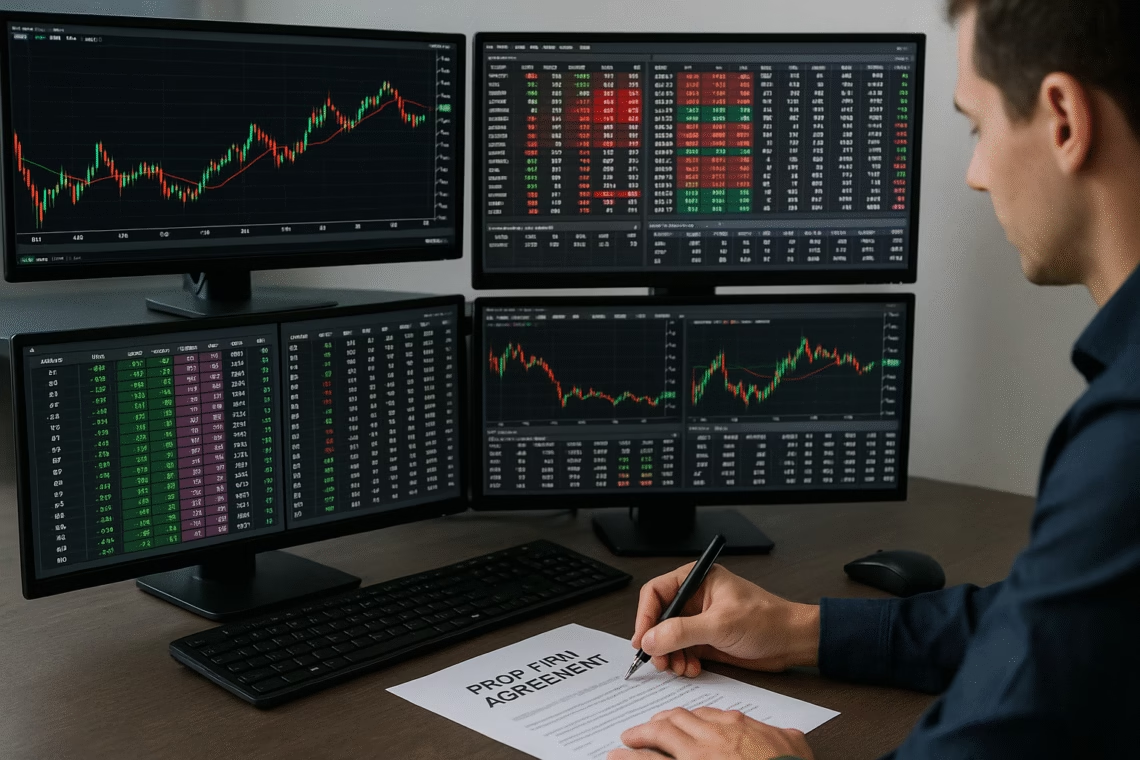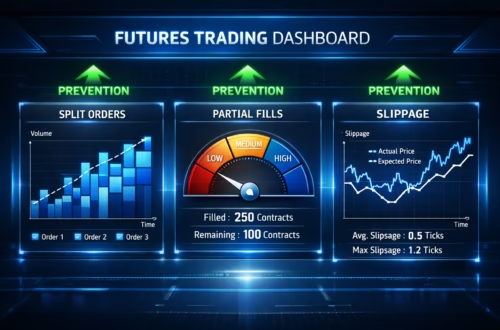A prop firm, short for proprietary trading firm, is a company that allows individual traders to trade with the firm’s capital—not just their own money.
What many aspiring traders miss: the asset class you trade (stocks vs futures vs options) fundamentally changes your experience, rules, risk, and reward when working with a prop firm.
Prop Firm for Stocks: What you need to know
How stock-prop firm trading works
In a stock-focused prop firm: you may trade individual equities, ETFs, possibly options on stocks, with capital provided by the firm. Stock prop firms often suit day traders or momentum/scalping traders.
Key benefits
- Direct access to stock markets (e.g., US equities) with high liquidity.
- Familiar commission and platform structures for many traders.
Key rules & risks
- Prop firms may impose maximum drawdowns, profit targets, minimum trading days.
- If you trade stocks, you must manage overnight risk, sector risk, earnings announcements, etc.
- Automation (like with PickMyTrade) can help manage trade entries/exits, but you still must align your stock strategy with the prop-firm’s rules.
Prop Firm for Futures: How it differs
Unique aspects of futures with prop firms
When a prop firm focuses on futures, you are trading standardized contracts (indices, commodities, interest-rates) rather than individual stocks.
Advantages
- Futures often offer high leverage and strong liquidity for major contracts.
- You can trade based on macro-themes, indexes, and broad moves which may align with automation strategies.
Drawbacks & special rules
- Prop firms specialising in futures tend to enforce stricter risk limits (e.g., no overnight holds, daily loss caps) and tighter position size rules.
- Because of contract expiry and leverage, risk is amplified.
- If you integrate automation via PickMyTrade, ensure your system is wired to account for contract roll-overs, expiry, and firm-specific restrictions.
Prop Firm for Options: What to expect
Options trading within a prop firm context
Prop firms that support options allow trading strategies based on calls/puts on stocks, indices or futures. An options-prop firm often demands specific experience due to complexity.
Pros
- Options enable strategic flexibility: you can hedge, speculate with defined risk or deploy spread trades.
- Good fit for automation systems that recognise pattern-breaks or implied volatility shifts.
Cons/Risks
- More complex instruments = greater risk of mis-execution or large losses.
- Prop firm rules may impose extra constraints (e.g., restrictions on complex multi-leg trades).
- When using automation (PickMyTrade), you must ensure the system understands options-specific nuances (time decay, Greeks, expirations).
Click Here To Start Options Trading Automation For Free
How to choose the right prop firm for your style + automation
1. Define your trading style
- If you prefer trading individual stocks and momentum setups → stock prop firm.
- If you are macro-driven, trading indices/commodities → futures prop firm.
- If you like volatility, spreads, multi-leg strategies → options prop firm.
2. Match firm rules to your automation system
- Check evaluation criteria: profit targets, drawdown limits, allowed instruments.
- Ensure your automation (via PickMyTrade) can handle the firm’s rule set (e.g., no overnight, contract expiry).
3. Compare cost/capital/benefits
- Entry fee or subscription for evaluation phase.
- Profit split percentage once funded.
- Platform/tools/technology provided.
4. Review transparency & track-record
- Are rules clear? Are payouts reliably issued?
- Are there hidden constraints that your automation system might violate unknowingly?
5. Build automation-compatible workflows
- For stocks: incorporate scanning, trigger logic, trade execution.
- For futures: incorporate contract specificity, rollover logic, larger size risk.
- For options: incorporate Greeks, expiration logic, multi-leg structure.
By aligning your automation setup (PickMyTrade) with the type of prop firm you pick, you increase the chance of staying compliant, scaling and generating consistent results.
Summary – Prop Firms: Stocks vs Futures vs Options
- A prop firm gives you access to firm capital under rules and risk-management.
- Stocks are more familiar but may have more overhead (earnings risk, overnight).
- Futures provide high leverage and macro-moves but come with stricter rules.
- Options offer strategic flexibility but require deeper knowledge and disciplined automation.
- Your automation system must be built to respect the type of instrument, the firm’s rules, and risk controls.
- Choose the instrument type and firm that fit your strategy, and then build your automation around that.
FAQ – Most Asked Questions on Prop Firms
A prop firm is a trading firm that provides capital to traders (after evaluation) and shares profits, while enforcing rules and risk limits.
No — many prop firms specialise (e.g., only futures, only stocks, or only options). Check the instruments supported.
You can use automation to trigger trades, manage risk, and scale execution—but your system must align with the prop firm’s rules and instrument type.
It depends on your skill set. Futures firms often impose stricter risk rules; options require more knowledge; stocks can be more forgiving but still need discipline.
Typical rules: hit a profit target (e.g., 6-10%), avoid daily drawdown limit (2-5%), and adhere to contract/instrument rules within a set time.
Some firms allow scaling or switching, but many specialise—so you’ll want to begin in the instrument type that matches your system.
Also Checkout: Algorithmic Trading Systems: Enhance Futures Trading Efficiency





